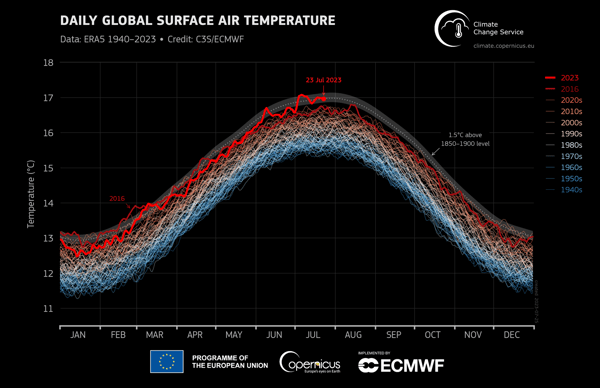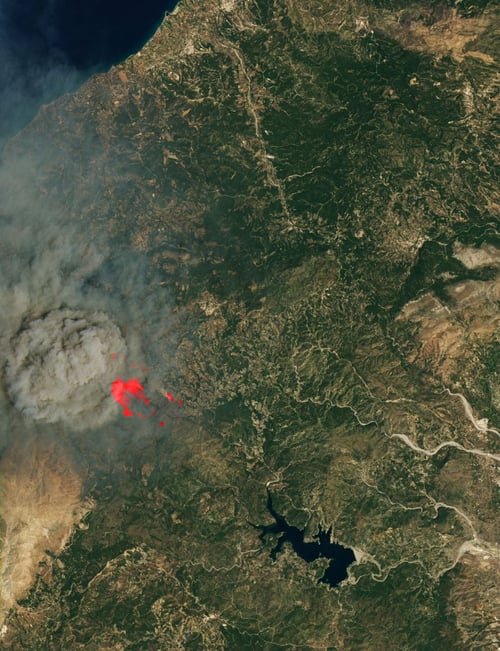“Short of a mini–Ice Age over the next few days, July 2023 will shatter records across the board.”
– United Nations Secretary-General António Guterres
July 2023 will not only be the hottest July on record but will be the hottest month ever recorded on Earth. After back-to-back days of record-breaking global heat earlier in the month, global temperatures have continued to exceed all previous records, reaching an average of 16.95°C and a staggering 21 of Earth's 30 hottest individual days occurring this month.
In the Northern Hemisphere, heatwaves are currently spanning entire continents and are fuelling wildfires, food & water shortages and heat-related deaths. With El Niño still in its developmental phase it is likely to drive temperatures even higher.
 Global daily surface air temperature (°C) from 1 January 1940 to 23 July 2023 Data: ERA5. Credit: C3S/ECMWF.
Global daily surface air temperature (°C) from 1 January 1940 to 23 July 2023 Data: ERA5. Credit: C3S/ECMWF.
The human toll of so many sustained heatwaves is clear - during the European heatwave of 2022, there were 61,600 deaths related to heat and with the increase of sustained heatwaves this year, numbers are sure to be much higher for 2023. The Southwest of the US and Mexico, Southern Europe and China are all experiencing record temperatures, and are seeing new nightly high temperatures as well, meaning there is no reprieve from the heat for many communities.
Along with the impact on lives, the economic impact is being felt across the Northern Hemisphere, with tourist hotspots, restaurants and national parks being closed to visitors due to heat. As the global climate warms and we see an increase in these types of heat events, it is clear that climate change is not just a problem for the Northern Hemisphere. Heatwaves in particular may see short-lived economic impact such as increased pressure on power grids, but the long-term ramifications for a warming planet are serious and widespread.
 A satellite image of one of the wildfires burning on the Greek island of Rhodes, July 27 2023 (Source: NASA)
A satellite image of one of the wildfires burning on the Greek island of Rhodes, July 27 2023 (Source: NASA)
Since the 1990s, it is estimated that heatwaves have cost the global economy over $16tn. Heatwaves can damage crops, reduce yields, and increase irrigation needs, leading to lower agricultural productivity and potential food and water shortages. Livestock can also suffer from heat stress, affecting meat and dairy production.
High temperatures can cause roads to buckle, railway tracks to warp, and buildings to experience heat-related damage, while labour workers may suffer from heat stress, or need to stop work entirely. Heat related illnesses put pressure on medical systems, and can increase the cost of insurance premiums as a result. All of these scenarios require an increase in public spending, through an allocation of funds for emergency response measures, relief efforts, and long-term climate adaptation strategies to cope with the effects of heatwaves.
Businesses too, must adapt practices to mitigate risk due to weather events caused by a warming climate. The increasing frequency and severity of climate-related physical risks, such as heatwaves, storms, and floods, threaten business infrastructure and supply chains, leading to financial losses. Failure to address climate risks can harm a company's reputation, impact insurance costs, and even lead to legal liabilities. Long-term sustainability, investor expectations, and the well-being of the workforce further underscore the urgency for businesses to implement climate-conscious strategies and ensure resilience in the face of a changing climate.
.png?width=600&height=417&name=MicrosoftTeams-image%20(6).png) Areas of red showing an increasing trend in extreme heat events through EWN's Climatics tool
Areas of red showing an increasing trend in extreme heat events through EWN's Climatics tool
Although Australia is in the middle of winter, many cities saw new records throughout July for highest day and night temperatures. This is another reminder that here at home, we must adapt to the changing climate and prepare for future weather events.
With Climatics, you can build a comprehensive picture of past climate events, and see how your business assets will be impacted in the future and help you to prepare for a changing environmental landscape.